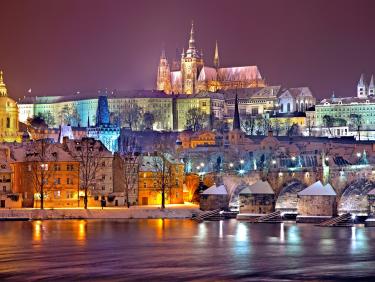Faculty of Modern LanguagesSlavic Studies
The Slavic Studies degree programme focusses on the languages and literature of the Slavic countries in their historical and cultural context.
Slavic Studies combines solid language training with fundamental knowledge and research skills in the areas of linguistics, literature, and cultural studies, while, on a number of levels, opening a window to Eastern and East Central Europe and providing students with linguistic and cultural skills. Students will obtain essential key competencies as well as sought-after expert knowledge of our increasingly globalised and interconnected world, particularly as regards the expanding relationship between Europe and the countries of Eastern, East-Central and Southern Europe.

Special Features and Characteristics
The Institute of Slavic Studies at Heidelberg University offers students a broad range of Slavic languages and literature, including Russian, Polish, Czech, Serbo-Croatian, and Bulgarian. No prior knowledge of Slavic languages is required for admittance to the Slavic Studies degree programme at Heidelberg University. All Slavic language courses offered at the Institute of Slavic Studies provide basic language education for which previous study of the language is not necessary. Language tandems and conversation courses are additional aids to students in gaining solid language mastery.
Based on this linguistic and cultural diversity, Heidelberg’s Institute of Slavic Studies places great value on comparative research approaches. This includes not only its interdisciplinary approach to Slavic languages but also its interaction with related departments and institutions. In addition, the Institute of Slavic Studies at Heidelberg University maintains close working relationships with leading institutions in Europe and North America - an advantage that provides students with a variety of benefits.
The highly-motivated faculty members at the Institute of Slavic Studies include professors with many years of international experience, young junior researchers, as well as lectors who are equally highly-qualified in both language didactics and research. The open and friendly atmosphere in the department, enhanced by small-group activities in language courses and seminars, allows instructors to engage with students on an individual basis, and to provide a high level of personalised support. Students with appropriate qualifications will be invited at an early stage of their studies to participate in Institute projects (e.g. conferences, translation projects, etc.).
Research
The expertise possessed by the Chairs as well as the instructors at the Institute of Slavic Studies ensures that students are receiving the broadest and most comprehensive picture possible of the diversity of Slavia. This includes a literary focus on authors of nineteenth-century classics, such as Pushkin, Gogol, Dostoevsky, and Tolstoy, as well as on avantgarde poetry and modern literature. Particular emphasis is placed on comparative approaches. Another important area of studies is the theory and practice of literary translation.
Linguistic research topics include the study of language transformation in both the recent and ancient history of the Slavic languages. This historical research does not begin with the emergence of the individual Slavic languages during the early Middle Ages, but goes further back to study what is referred to as “proto-Slavic”, which predates the written word.
In the study of modern Slavic languages, socio-linguistic issues (such as bilingualism and multilingualism, language varieties research, the language of the media prior to and following the political transformations of 1989), language contact research, and typology play especially important roles.
Occupational Areas
With the broad range of skills that graduates of Humanities programmes acquire, they are attractive candidates for a wide variety of professional opportunities. The knowledge of language, history, and culture of the Slavic countries that students will have acquired during their B.A. studies makes them particularly well-qualified for positions in an intercultural professional environment, especially in the areas of:
- Intercultural exchange (e.g. cultural institutions, foundations)
- The education sector (e.g. publishing houses, adult education)
- Research (especially if further academic credentials are obtained).
In particular, the inclusion of Eastern European countries in European institutions provides graduates of Slavic studies with an opportunity to serve as a societal bridge between Germany and its eastern neighbours in the areas of communications and collaboration.
Students who specialise in Russian language studies may subsequently enrol in a Master of Education degree programme that qualifies them for student teaching positions as Russian teachers in German Gymnasiums (highest-level-secondary school).
Insights

I chose Slavic studies because I was interested in my heritage. I also wanted to study something exotic that not many people know a lot about.
Kristina Gusak, 27, Slavic Studies, 9th semester Bachelor





